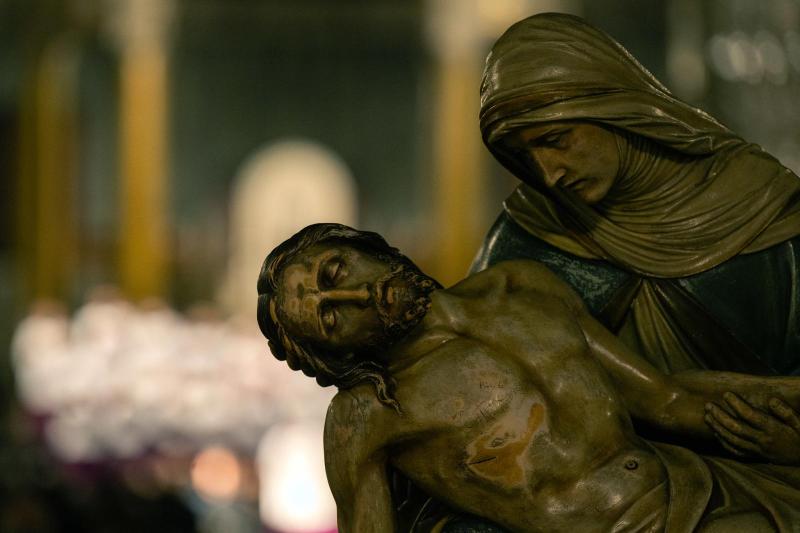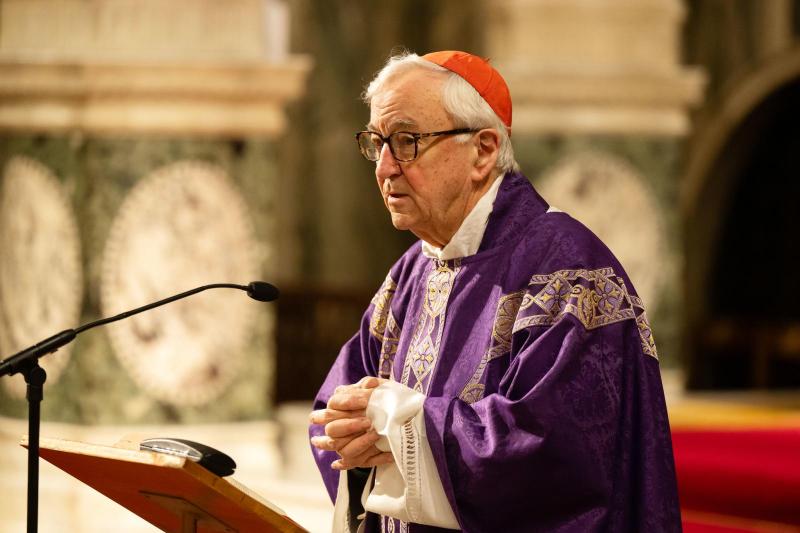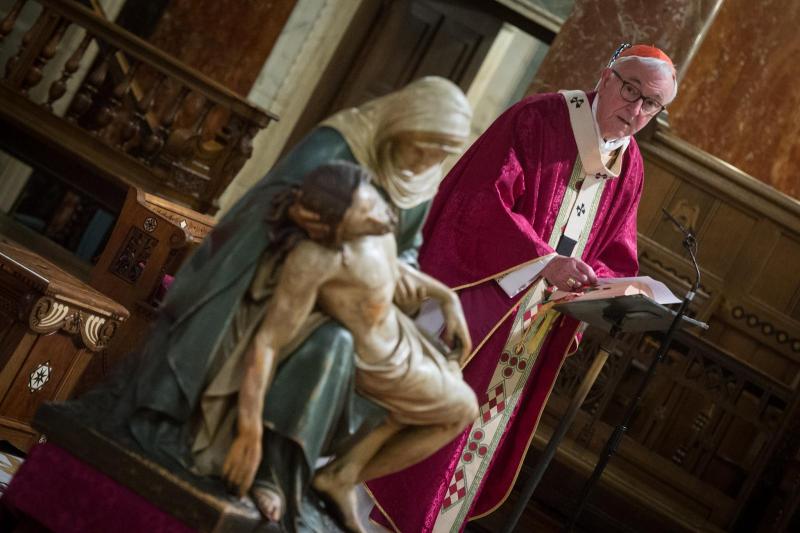The Most Reverend Vincent Nichols, Archbishop of Westminster, addressed the Muslim Council of Wales at the National Museum of Wales as part of a visit to Cardiff. The title of his keynote speech was ‘The Need for Spirituality in the Modern World’ and the full text can be found below.
'The Need for Spirituality in the Modern World'
My brothers and sisters
I thank Saleem Kidwai and the Muslim Council of Wales for this invitation - to be present here in Cardiff with this long established Community and to address you all on this important theme.
The subject of spirituality is, of course, as vast as the ocean and as deep as the earth. It is important to try to give it some perspective, some clearer definition, certainly from a religious point of view and, for my part, from a Christian perspective.
At the heart of such spirituality is the practice of prayer because spirituality is the quest for God and prayer is the raising of the mind and heart to God. This is the essence of the spiritual life. Or, more correctly, as Cardinal Hume often said: the essence of prayer is trying to raise the mind and heart to God.
So the spiritual quest involves a relationship between myself and God. That means that in the quest of spirituality I am grappling with two interconnected mysteries: the depth of my own being and the depth of the mystery of God. These two are the true dimensions of spirituality: our human openness to the depth of our being and God's openness to us, His creatures. A spirituality which consists only in the exploration of the depth of our own being and which is closed to the call of God will, I believe, sooner or later become purely self-regarding and self-preoccupied.
The words of Psalm 41(42) convey the essence of the spiritual quest:
'Like the deer that yearns for running streams
So my soul is yearning for you, my God.
My soul is thirsting for God, the God of my life,
When can I enter and see the face of God.
Deep is calling on deep in the roar of waters
Your torrents and all your waves swept over me.
The depth of our being calls out for the presence of God. The depth of the mystery of God reaches out towards us, his beloved creation. Deep calls on deep. This is the dynamic of spirituality, with its two essential aspects: entering the depth of both our humanity and the depth of God.
Entering our own depth requires the practice of some stillness and quiet in the midst of a busy life. We have to be able to go beyond the roar of everyday events, of the tumult of our own emotions, of the bombardment of outside stimuli. Each of us, in our own way, has to develop a time and a space for this stillness, for this depth to be entered.
Today we need, as ever in the past, to help each other to live reflective lives, lives that are more than the rapid succession of achievement or failure, of satisfaction or frustration, of highs of great energy and restless sleep. Across the ages, from Socrates and Plato, comes the axiom that the unreflective life is not worth living.
In this way we begin to reach for the place of stillness within ourselves, that inner self, that 'true me'.
This fleeting sense of self, which we may only glimpse every now and then, is also well expressed by the Psalmist in Psalm 138(139), which was our reading from the Bible earlier this evening:
O Lord, you search me and you know me
You know my resting and my rising
You discern my purpose from afar.
For it was you who created my being,
Knit me together in my mother's womb.
I thank you for the wonder of my being,
For the wonders of all your creation.'
In this search for the stillness of our inner selves we are striving to appreciate the 'wonder of my being', the uniqueness of the gift of life I have received and the depth of the mystery to which my very being is open.
In sensing that openness within me, I am led to enter into the depths of God. Please do understand, I am not equating or identifying our human depth with the depth of God for, strange as it might seem, to travel the pathway of true spirituality means stepping out into the utter otherness of God, into the totally transcendent nature of the Divine Being. God is beyond all beauty and majesty known to us. God is beyond all activity, even though God is the creator of all the beauty and goodness we see around us. The God before whom we stand is simply, in one phrase, 'the ground of all being', before, beyond all imagining and all knowing. Our spirit has to be tutored to be silent before this utter immensity of God, still, open, humble and ready to receive.
Of course on this journey of our spiritual quest, there are many signs and gifts to assist us. With the eyes of the spirit we see the world around us as the work of God's hands. We acknowledge that it is the Spirit of God, hovering over the chaos, which brings forth an ordered world, a cosmos, which then becomes the object of our endless wonder, study, and investigation. Indeed we can say that it is only the presence of God that makes our world intelligible. This, incidentally, is the radical complementarity of faith and science. It is, then, from these wonders that the spiritual mind and soul is directed on to stand before their maker in His majesty and Transcendence.
I wish now to speak of spirituality from a Christian perspective and how I hold that the Christian faith takes me deeper into this double mystery and into this same dynamic of spirituality. In the light of this faith I, and those who share this faith, come to know the Christ as the Son eternally begotten of the Father. Christians acknowledge Christ, God the Son, to be the eternal Word, the expression of Father, through whom the very life of God is poured out in the loving, continual, act of creation. Through this eternal Word all things have life. And that one eternal Word is born in our flesh, by the power of the Holy Spirit, the very love of Father and Son. The Word became incarnate of the Virgin Mary, became man – the man Jesus of Nazareth.
So the Christian, the disciple of Jesus, can look to the man of Nazareth to see in his words, his deeds, his life and his death, the very actions of God. And there he sees the actions of endless mercy and compassion for those in need, the healing of the sick, the comfort of the destitute. There he sees a passion for justice coupled with the gift of forgiveness, the giving of hope in times of desperation and the opening up of the promise of eternal life beyond the portal of death, for the man of Nazareth rose from the dead to open for us the way to heaven.
In this faith, spirituality becomes Christian, Christ centred for in Him the mystery of my inner-most being is laid before me and in Him the depth of the life of God enters this world. Christ then becomes the light, which is rooted in the tangible events of the past and which illuminates the pathway of the future. His light casts a very new and revealing light, not taking away every darkness or distress, but pointing to sure and certain steps which make up the pathway of life eternal. In this faith, spirituality becomes the sharing of a memory, which comes from the past, but it also a 'memory', or recalling, of our true future. For the memory of Christ culminates in the hour of his death, which shows forth the depth and breadth of his love, a steadfast love capable of embracing death and therefore capable of bearing our hope and expectation for our own and every future.
If this is the framework of Christian spirituality, what is its aim, its purpose? St Augustine puts it like this: 'What does it avail me that the birth of Christ is always happening if it does not happen in me?'
There, then, is the purpose of Christian spirituality: that Christ is born in me each day: the Christ who comes from the deepest mystery of God, from all eternity; the Christ who is the fullness of humanity who alone knows the secret of my being and who can satisfy the longings of my spirit.
This birth of Christ within me for today and for eternity is the promise of salvation entertained by every Christian. And it is not deceptive as long as we understand that the human person, alone among all created beings, has within the capacity, the spiritual capacity, to be a place in which Christ is born again each day. All created things bear the trace, the stamp of the Divine Creator. The beauty of the flowers, the strength and gracefulness of the animal world, the immensity of space, the intricacy of molecular structure, all bear the imprint of the Creator. But, as the Book of Genesis, the first book of the Bible, reminds us, the human person God created in his own image and likeness. The human person, then, not only bears the imprint of the Creator but also the capacity to be like that Creator, to share the one and same life of the Creator.
In the language of Christ the eternal Word of God, the human person is the one place in creation in which that Word, which is being continually spoken, finds an echo, a resonance, which enables it to remain, to dwell there within the person, forming and reshaping his spirit and from there to produce its fruit. So the ambition of Christian spirituality is that the Word takes flesh in me and that in my life that Word continues to bear its fruit, just as it did in the humanity of Jesus, but not, I confess, ever in that same perfect measure.
What, then, is the need, the importance of spirituality in our world today?
The spiritual quest, in all its forms, seeks to lay bare the true foundations of our living. When that spirituality is rooted in the quest for God, then it moves in the direction of truth, for in God lies the true foundation of all that exists. Without a true spirituality we risk building our great achievements, the skyscrapers of our ambitions, on sand.
Spirituality is our striving to make sense of who we are and of the purpose of our existence. This, too, finds its right path in the light of the mystery of God. Without a true spirituality, we end up believing that we are the centre and high point of all that exists. That is a faith which, in the end, crumbles before the harshness of reality, the reality of both life and death.
In order to follow the path of spirituality, in its beginnings and progress, we need to create those times of silence and recollection. This, too, is such a great need in our society today. For me, and for many, the presence of open spaces in the midst of our cities, their parks and gardens, are vital recognition of this dimension of human living and being. It is no coincidence that the unfolding of the Judea-Christian revelation concerning human well-being begins and ends in a Garden.
I understand, too, that the Muslim reflection on the nature of the true city seeks for harmony, symmetry and space to be part of its structure and character. In that tradition, an Islamic garden is a cool place of rest and reflection and a reminder of paradise. Such a garden has water and shade and is intended for rest and contemplation.
In Wales and in England we should always be grateful to our Victorian forebears who recognised this need of the human spirit and laid out so many parks and gardens in which the first steps of our spiritual journey are often taken.
Within the heart of the spiritual quest we will also discover the true architecture of our human relationships, how we are to see one another, relate to one another, build our communities and care for the needy. In the light of faith as lived in this spiritual journey we are taught always us to view one another as creatures of the living God, endowed by the Creator with a dignity that should be respected from the first beginnings of life to their natural end. In this light we come to know the difference between right and wrong, not reduced to a matter of opinion or poll. Then we know how to promote what is good, which goes far beyond trying to banish wrong doing by legislation. In a spiritual journey, we find the inspiration for a way of life which reflects the mind of God, which, for the Christian, gives flesh again to the Eternal Creative Word of God through whom all things are made and through whom all things are rendered pure and good.
Through the spiritual quest we also reach for those sources of new life and new encouragement which we need if we are to sustain ourselves in the cause of good, in the service of others, in the work of compassion. We human beings are created to do good and in doing good we are most satisfied. There we find our lasting contentment. The spiritual quest strengthens in us that instinct and sustains in us that effort especially when times are demanding and the challenges before us are difficult.
In that sense, for these are difficult and demanding times, the need for spirituality has never been clearer or more urgent. All that we can do, from the richness of our different traditions, to promote and sustain that spiritual quest is indeed a service to the common good from which no one should be excluded.
In our Catholic community we have been observing a Year of Faith. I conclude with a prayer written for this Year which sums up much of what I have wanted to say:
Lord,
Let me see your face,
Know your heart
And experience your love in my life.
Strengthen in me
The precious gift of faith.
Lord, I believe,
Help my unbelief.
Amen.



